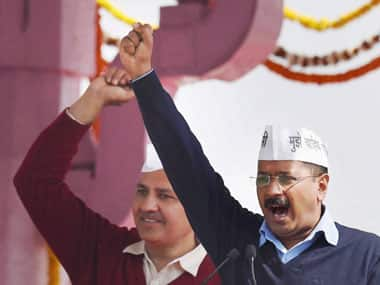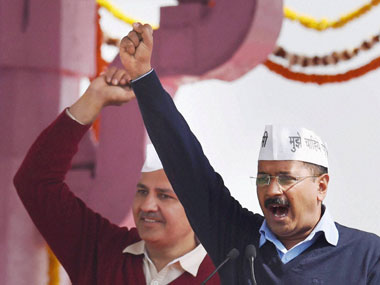The deluge of analyses of the AAP win seems to have slowed down even as the Arvind Kejriwal government gets to work in Delhi. Now it’s time for realpolitik again with the Prime Minister Narendra Modi mocking its poll promises and Congress leader Digvijaya Singh terming the party an RSS project. Certainly, old habits do die hard. And this is precisely why political parties in India read different meanings into a single event — the AAP victory. It was an unprecedented mandate in Indian history in which about 96 percent of the seats in an assembly election went to the same party. Stunned by catastrophe, both the BJP and the Congress initially appeared modest and said they would learn from the experience; but unsurprisingly, both took wrong messages home. [caption id=“attachment_2102043” align=“alignleft” width=“380”]  AAP leaders Arvind Kejriwal and Manish Sisodia during the swearing-in. PTI[/caption] In its own routing, the BJP found the end of Congress, because according to them, their vote-share was more or less intact — it got depleted by only one percent — while the Congress was completely wiped out. The AAP victory was at the expense of the Congress, the party said, appearing smug. Did it learn anything else from the AAP victory? Officially, it hasn’t said anything. Perhaps, the party sees it just as a blip. The Congress, on the other hand, also did rejoice in AAP’s victory because it humbled Narendra Modi, but in terms of lessons, it has noted nothing other than the style of campaigning. In an interview with Times of India, party leader, Digvijaya Singh said that Rahul Gandhi wanted to run a “Kejriwal-type” campaign, but was not allowed. Instead of soul-searching for its worst ever defeat in any election in India, Singh was also looking for conspiracy — he thought the AAP was a product of RSS to weaken the Congress. The AAP victory also inspired leaders of regional parties to come up with their own learning for muckraking and aggrandisement. For the Shiv Sena, it was a godsend to bash Modi and BJP. “The entire election campaign was run in the name of Modi. Anna Hazare said this is Modi’s defeat. We too feel the same. The way the party attributed its success in other states to Modi, they should do the same for Delhi,” wrote th e party mouthpiece Saamana. Bihar chief minister Nitish Kumar also found a handle to beat his current bete noire. “Delhi election results indeed is a referendum on Prime Minister Narendra Modi. Delhi is the heart of the country so it reflects the mood of the country…Astonishingly in such a short span of nine months of the Narendra Modi government, the mood of people is changing against him.” Mamta Banerjee found great inspiration from the AAP victory and in fact had sided with them ahead of the polls because she thought their politics were similar. Down south, DMK chief M Karunanidhi and his daughter Kanimozhi found the win as a victory of “secularism”. “One major thing is that the country still thinks secularism is very important,” Kanimozhi said, while according to her father, the “victory has proved beyond doubt that the people of this great country have always stood by secularism and democracy.” The most interesting, however, was the rapid response from the PMK, a small Tamil party that is otherwise accused of downright anti-Dalit, caste politics. The party chief S Ramadoss said “this year it is AAP tsunami, and next year it will be PMK Tsunami in Tamil Nadu.” On Sunday, he even announced his son, former union minister for health Anbumani Ramadoss as the party’s chief ministerial candidate as the Kejriwal equivalent of the party. Wearing the inspiration from AAP on his sleeve, Ramadoss asked his supporters to emulate Kejriwal. “How it happened… he (Arvind Kejriwal) met all the voters in the past one year and similarly functionaries should go door-to-door and meet all 5.25 crore voters of Tamil Nadu.”. A single event and multiple interpretations — a common theme in literature and arts. Here, each party has interpreted the result through a prism of its convenience and weaknesses. Unfortunately, none of them are anywhere close to real truth. Steeped in top-down, divisive and corporate-friendly politics, the BJP didn’t see a politics that was bottom up, spontaneous, pro-poor and uniting. The Congress didn’t see a politics that was anti-communal, but didn’t try to make political capital out of it. Leaders such as Ramadoss and Lalu Prasad Yadav didn’t see a politics which demonstrated that caste doesn’t need to polarise people to win elections. Karunanidhi and Kanimozhi didn’t see a politics that arose from a swelling tide against corruption. And Rahul Gandhi certainly didn’t see anything other than Kejriwal, his young volunteers and their flash dances. Is it that the political parties do not know that the AAP-victory is the triumph of a new idiom of politics in India that people pour their hearts and minds into? Don’t they realise that what they have found as reasons of its success are only the externalities that supported the core? Don’t they realise that people are against corruption, divisive politics and anti-welfare economics, and are class-lessly eager to participate in democratic processes? They certainly do, but for their survival, they have to perpetuate the self-generating socio-political complex they have created and read wrong meanings of anything that is progressive and capable of empowering people. Had it been so simple, poor Rahul Gandhi should have won a few more seats because in 2013, when AAP made its first mark in Delhi, he had said that “we will learn from them, and we will involve people in a way that no one has ever done before. You cannot learn from AAP because you have gone the wrong way too far.
Political parties in India read different meanings into a single event — the AAP victory. But here’s why they won’t learn anything from it.
Advertisement
End of Article


)
)
)
)
)
)
)
)
)



